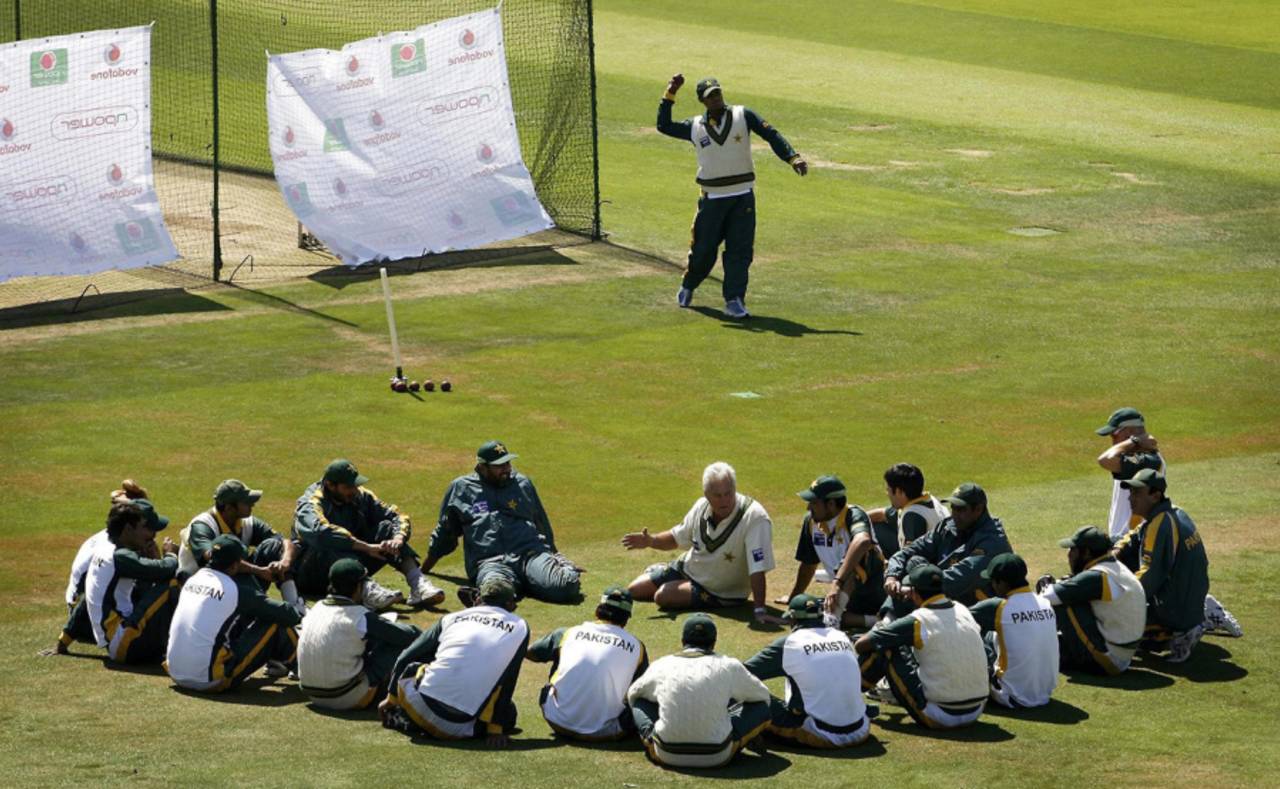Thanks Bob, you did make a difference
In time, it will become clear that he had done enough with Pakistan, with South Africa, with Warwickshire, with the ICC and with the game
Osman Samiuddin
18-Mar-2007

Bob Woolmer lived by the theme "Yesterday is history, tomorrow a mystery, so concentrate on the now" • Gareth Copley/PA Photos/Getty Images
There are occasions when words, or anything else, are not enough. This is one of those occasions.
The last time I met Bob Woolmer was shortly before the team left for South Africa, over a seaside dinner, where, with a few other cricket tragics, we dissected the West Indies series, Pakistan openers, slip catching and South Africa. A dodgy stomach apart, he was much as I have known him over a couple of years.
Our first real interaction had been on Pakistan's tour to India at the beginning of 2005 where, in a Vishakapatnam hotel, we talked, with John Wright, about how to deal with erratic players like Shahid Afridi and Abdul Razzaq (the gist being it was more in the mind than in the body).
In October of that year, a rare bubbly time just before the England series that was to be the highlight of his tenure as Pakistan coach, we had our first prolonged interview. In a lengthy, frank chat in the afternoon Ramadan heat at the National Stadium in Karachi, he said as much on the record as he did off it and a rapport was immediately established. He had been a Wisden columnist and written regularly, which helped.
By then, a year into his job - a year of relative calm - he appeared keenly aware of the country's traditional volatility. He used one of his more prominent catchphrases then: 'Yesterday is history, tomorrow a mystery, so concentrate on the now,' and few axioms apply so aptly to Pakistan. He also chirped Inshallah (god willing) to Pakistan's prospects in forthcoming encounters, having quickly picked up on the time-honoured Pakistani response to uncertainty.
For a journalist he was a dream: genial, a dry wit and rarely flustered. Above all, he was always accessible, in person, on the phone, via SMS and e-mail. He didn't tire of talking cricket on and off the field, ready with a quote or three. Beyond cricket I knew little, but I always felt after he left the Pakistan job, I probably would, over time, continents, countries, e-mails and text messages, uncover more.
People have noted he was media-savvy and, in light of his own coaching website and a regular stream of articles for various publications, it is difficult to argue. Certainly, he read cricket. He always made sure to tell me I was a crap writer and didn't know what I was writing about; very occasionally, he pointed out that I might indeed have made a valid point.
Signs of what made him one of cricket's early super-coaches in the mid-90s were still present, in innovative training sessions and a willingness to think beyond the field. He spoke, in our first interview, of how difficult it was to work around the hierarchical structure of cricket in Pakistan, where the oldest player is often captain and difficult to approach for younger players. Touch football, which Pakistan played in most training sessions, was his way of getting youngsters more comfortable in interacting with Inzamam-ul-Haq and thus eventually to working with him on the field.
Though it wasn't remembered recently, he did make a difference, for a time, to Pakistan and that is achievement enough. Younger and temperamentally fragile players responded initially to his openness, his shunning of dressing downs and embracing instead of a more open, talk-it-out atmosphere. For a phase, Pakistan bubbled; no factionalism, binding forces aplenty, victories on the field and a captain and coach in sync.

What made Bob special: innovative training sessions and a willingness to think beyond the field•Jewel Samad/AFP/Getty Images
Sadly, it fell away after the Oval Test, one of the more significant fall-outs from the dressing room fiasco that day being a cooling in relations between Inzamam and Woolmer. Shoaib Akhtar was a more prominent personnel challenge, though Woolmer wasn't the first and won't be the last to have discovered that.
Outwardly, the sheer madness of the last six months didn't appear to have worried him - c'est la vie he once reasoned merrily - but underneath that surface who knows. He had thought of resigning in August after the Oval Test, since when matters in Pakistan cricket became only more volatile. His future after the World Cup, he said privately and publicly, was undecided but the prospect of finishing a book on his coaching life, from experiences in South African townships to Lahore via much else, was one priority.
No matter now, for what has gone previously, what he did as player or coach, whatever has happened, all of it is irrelevant at this moment. In time, after sorrow and regret, it will become clear that he had done enough with Pakistan, with South Africa, with Warwickshire, with the ICC and with the game to be remembered as an innovative, successful coach and not for a last-game defeat to Ireland. My last interaction with him was through e-mail. He wished me a speedy recovery from illness. I can no longer do the same to him and none of this is nearly enough. God bless your soul, Bob.
Osman Samiuddin is Pakistan editor of Cricinfo